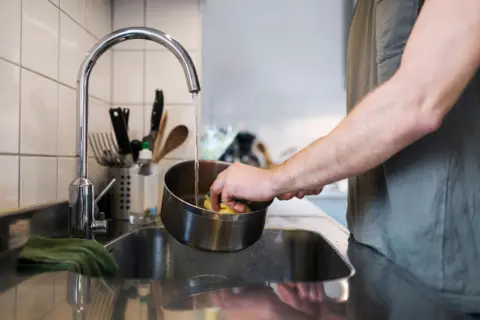 Getty Images
Getty ImagesIt is being dubbed “awful April” with a range of household bills set to go up in the next few days.
There is nothing much you can do if your council tax is increasing, or you are buying a house and facing a higher stamp duty bill.
But when it comes to other bills, such as energy, water or broadband, here are three strategies that could help ease the pressure.
1. Shop around
For some services you can often get a better deal simply by calling the company you are with and saying you are considering leaving.
“Shop around for better deals, and haggle with your existing provider,” says Alice Haine, from professional services group Evelyn Partners.
“It’s always worth haggling. Haggle for everything.”
That applies to a whole range of bills, including insurance, energy, and broadband.
“Our research shows that switching providers if you’re out of contract can slash broadband, pay TV and mobile bills by up to £235,” says Emily Seymour, from consumer group Which?
Gas and electricity are often the biggest bills people face and the price cap set by the regulator is rising by 6%, so it is worth finding the best deal for you.
That may include choosing a fixed rate deal, says Ms Seymour. If you charge an electric vehicle or use appliances overnight, look for a deal with a cheaper night tariff.
“We’d also recommend taking a meter reading as close to 31 March as possible to ensure you’re billed the correct amount for your energy usage,” she says.
 Getty
Getty2. Cut back
One surefire way to keep your bills down is to reduce what you use.
Taking shorter showers and putting in a showerhead with a slower flow will save money on your water and energy bills.
“You have to treat water as an expensive resource,” Ms Haine says.
Getting a water meter fitted may save you money, she adds.
Smart meters for electricity and gas can also help you keep tabs on what is pushing up your energy bills most, the Energy Saving Trust says.
The trust advises draught-proofing your home, including round floorboards, pipework and old extractor fans, and setting the thermostat to the lowest comfortable temperature. For most people, it says, that is between 18°C and 21°C.
MoneySavingExpert says you can save money by using the principle: “heat the human, not the home”. Using hot water bottles and electric blankets should work out cheaper than turning up the radiators.
You can also change the settings on combi or conventional boilers to save money, says Martin Lewis at MoneySavingExpert.
When it comes to transport bills, you can’t avoid the vehicle tax rise unless you ditch the car altogether.
But if you are taking the train it is also worth checking whether a railcard will help, points out Ms Seymour.
“To cut costs on rail fares, we’d recommend booking tickets in advance and splitting fares where possible,” she says.
3. Get help
If you are struggling to pay your household bills, don’t panic, says Richard Lane, chief client officer at the StepChange Debt Charity. He suggests creating a detailed budget that captures all your income and expenditure.
“This will allow you to get a clear picture of your finances and see how much you have leftover to pay toward any debts or make savings,” he says.
Then check what support you are entitled to.
Water companies offer lower “social” and hardship tariffs for people on very low incomes, so it is worth calling your provider. People claiming benefits can often also get lower tariffs for broadband.
“These organisations have a regulatory responsibility to treat customers fairly and will be able to offer you tailored support,” Mr Lane added.
There is the government’s Warm Home Discount, for people with high energy costs on a very low income, including Pension Credit. And people on low incomes are also eligible for a reduction in council tax.
Check if you qualify for a free TV licence. If you are over 75 and on Pension Credit or live with someone who is, then you will.
You may also be able to boost your income. Check which benefits you are entitled to on the independent MoneyHelper website, backed by the government, or using benefits calculators run by Policy in Practice and charities Entitledto and Turn2us.
If you are struggling with debt here are some other organisations that may be able to help.



